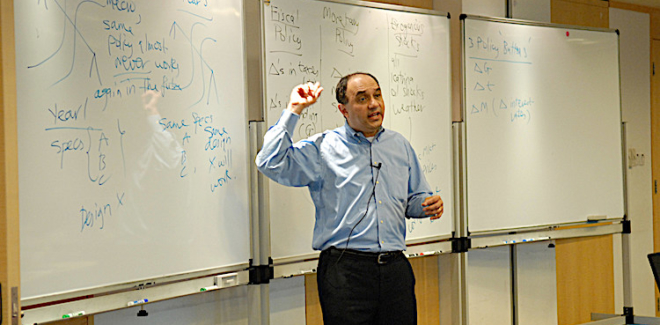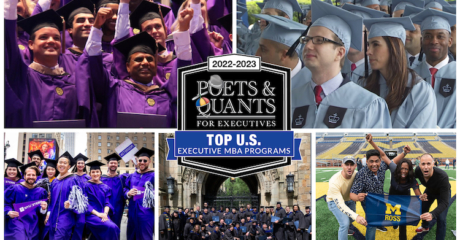Though not in New York City, Rutgers Buisiness School offers one of the strongest Executive MBA programs in the New York metro area. If you reside in New Jersey, the program–based on the school’s Newark campus–may well be a no-brainer. But even if you live in Manhattan or one of the boroughs, it may well be worth the 23-minute train ride to Newark.
For one thing, there’s the price. At $98,116, you can’t call it cheap. But it’s half the cost of the rival programs at Columbia, Cornell, and NYU Stern. The Rutgers program is even nearly $5,000 less expensive than Fordham University’s EMBA. And the price tag includes weeks in residence in New Brunswick, along with a ten-day summer China program. In fact, it even covers parking in downtown Newark where you’ll take the bulk of classes. The cost of the program was a major reason why Elizabeth Martin decided to do her EMBA at Rutgers.
“I needed a program that was going to provide me a good education at a reasonable price and a convenient location,” says Martin, a clinical director for infectious diseases at Merck who graduated with her Rutgers EMBA in 2019. “With the demands of my job and three young children, I could not be flying across the country to attend classes or driving hours to spend a weekend away from home. I also needed to be able to pay for the program without taking out loans, which would not have financially made sense for me. It wasn’t until after I started the program that I realized how lucky I was to also be in a program with such a supportive environment both from the faculty and the other students.”
For another, it’s a ranked program by both the Financial Times and The Economist. Poets&Quants‘ composite ranking of the best EMBA programs in the U.S. places it at 24th best in the nation. The program’s most recent rank among U.S. players in the FT list is 24th, while the school receives a ranking of 27th among U.S. EMBAs from The Economist. Ever since gaining its first EMBA ranking from U.S. News in 2003, the program has been able to attract students from outside New Jersey, particularly New York and Pennsylvania.
And finally, there is Farrokh Langdana, who has passionately run the program for the past 21 years since becoming director of Rutgers’ EMBA in 1997. Langdana, a professor of macroeconomics and international trade, gets to know every single student on a personal level, and many of them say he’s their favorite professor in the program. In fact, he has more than 30 MBA and EMBA teaching awards to his name, including the highest possible teaching award at Rutgers University, and even has a classroom named after him. Langdana insists that only Rutgers’ best professors teach in the program or he’ll go outside to bring in a teacher from industry with real-world experience.
As far as Langdana is concerned, the EMBA curriculum at Rutgers is an ever-evolving task. “I am surrounded by a number of intense programs,” he says, citing the likes of Columbia, NYU and Wharton. “Ten years ago, trying to match these guys would be a losing proposition. I had to outperform. So we put only superstar professors in the classrooms and we are constantly innovating the curriculum, with most of the changes coming from the students or the faculty. My course changes literally every semester. You can’t keep the same course every year. You have to update at least 20% of the course. That is our claim to fame. We update the cases as the world changes. In my microeconomics class, my textbook is The Wall Street Journal. The curriculum changes all the time.”
The 20-month-long program kicks off with a residential week at the Heldrich Hotel in New Brunswick which this year starts on Sunday, Sept. 8th, and run through Friday, Sept. 13th. During the five days in residence, students get to know each other in study groups that are organized by location and commute areas. More importantly, they do 25% of the entire semester in that one week. (In fact, the in-residence sessions are a cornerstone of the program because every one of the four semesters starts off with a residential week.) Then, classes are held on alernating Saturdays and Sundays for the rest of the fall term with a Saturday schedule on Sept. 21st and a Sunday schedule on Sept. 29th. The classes on these days start at 8:30 a.m. and finish at 5 p.m., with two subjects a day.
The program is dominated by the core curriculum. Composed of 57 credits, the core gets 45 of those credits, with 12 left over for electives. With the exception of the summer China program, all electives (three courses, chosen from nine to ten options) are taken in the final semester of the program. Langdana likes mixing these up. A new elective offering, for example, features seven to eight professors teaching different segments of a course called Finance For The C-Suite. Among other players, Liza Kapowitz, the former director of finance for Bed, Bath & Beyond, teaches in the course which covers everything from hedge fund strategies, exchange rate strategies, and tehnical analysis.
You may choose to pursue a concentration by taking all of your electives in the same area in finance, supply chain management, or marketing. Rutgers also allows students to take any evening course on either its Newark or New Brunswick campuses at no extra cost. “Some do a Tuesday night course in lean manufacturing, while other wanted to do real estate finance,” says Langdana. There’s also a Capstone Consulting Project for students interested in getting additional hands-on experience.
One innovative piece of the program is what Rutgers calls the “Powerhouse Advantage,” a sequence of stand-alone modules sprinkled throughout the four semesters, most of them initiated by current and former students and their employers. The series includes sessions such as Command Presence: Owning The Situation, taught by taught by an EMBA alum and VP of Consulting at Diversity Inc., or How To Make Ideas Stick, taught by associate marketing professor Kristina Durante. Then, there are courses that you would expect to find in an EMBA program, including Business Strategy, taught by a former senior executive at a large IT company who has been designing and implementing global strategy for nearly three decades, or Leadership Strategy, taught by a former CEO of PepsiCo.
A clear highlight of the program is a 10-day summer residency program in Beijing and Shanghai. The course includes business visits, seminars with key international business and government officials, and day trips. Students will witness first-hand the energy, complexity and dynamism of the Chinese economy, along with the challenges and opportunities for U.S. business in China. During the trip, students get to interact with Rutgers-China EMBA counterparts (RBS has been running EMBA programs in China on a continuous basis since 1993, longer than any other American university). Students then write a paper on the experience.
Graduates of the program inevitably have fond memories of their experience in China. ” I admired observing the real impact of international business, free trade, and the economic benefits that came with executing a well-planned economic growth strategy,” says Rojo Mathai, a Class of 2019 graduate who works as the director of consulting services at Publicis Groupé. “The benefits to the country and the people of China, who opened their markets to free trade, were very evident. There were moments when I thought, “If only people knew how much they would benefit through free trade and open markets, the world could be a better place.” Through a combination of the courses, I have now come to firmly believe that greater good for all can be accomplished only through economic growth.”
The latest entering class numbers 62 students and moves through the entire program as a cohort. Not surprising, students form strong bonds with each other. “It’s an extremely close group of people, and they really look after each other,” says Langdana. “We have had study groups get together two or three times a year 15 years after graduation. The underlying thing is it is a very big happy family. They really love each other. Saying goodbye from our recent China trip was actually painful. Other programs are very different from us. One of the wives at a program in New York was on one of our trips and said she was surprised that our students wait for each other to go out to dinner. She said if she missed class where she earned her EMBA, no one would ever give me their notes. It was so doggy dog. At our school, if you miss class, you get five sets of notes.”









